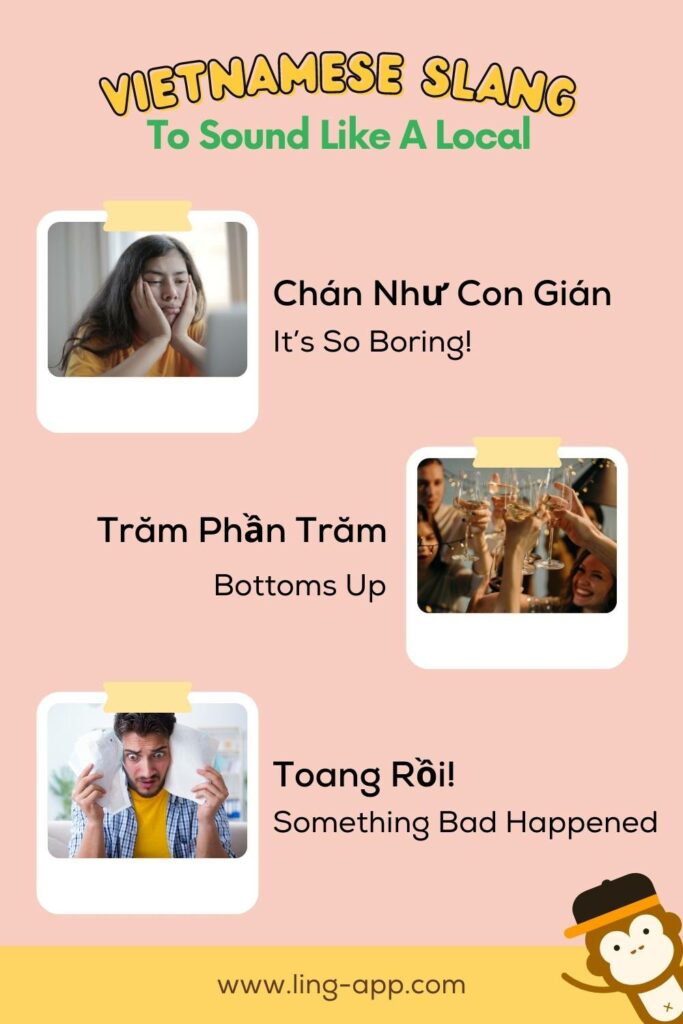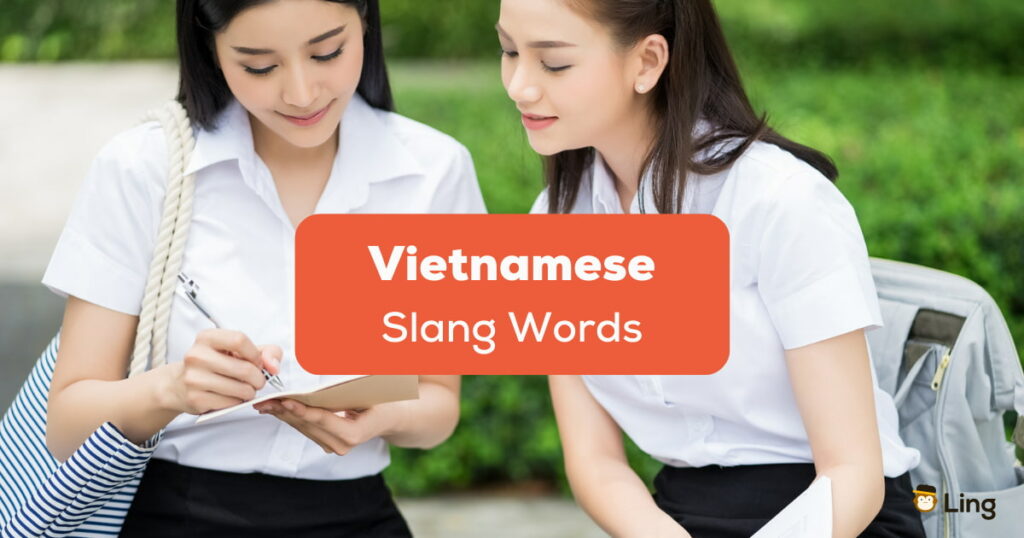In daily conversation, Vietnamese slang words are used very often. Vietnamese slang words make a sentence more fun and interesting. If you want to sound like a local, learn and use the following 12 common Vietnamese slang when you talk with your friends in Vietnam.
Vietnam is a wonderful place to discover food, friendship, and even love. It’s also a scenic country, so you will never get bored with what to do. But you’ll have to speak in Vietnamese to your friends sooner or later. And what’s the best way to really make them feel you’re at home? By speaking Vietnamese slang words and knowing more about their personality too. Shall we take a look?
What Are Some Vietnamese Slang Words?
1. Chán Như Con Gián – It’s So Boring!
‘Chán như con gián’ literally means ‘It’s so boring as a cockroach.’ You may ask, ‘What? Why a cockroach?’. The cockroach doesn’t relate to the boringness at all, but its name in Vietnamese matches the sound of the word ‘chán’, which means boring.
When you feel bored, you can say ‘chán như con gián’ to express that, although the phrase itself sounds a bit funny. This will definitely impress Vietnamese native speakers as they never expect you to know the slang phrase.
2. Trăm Phần Trăm – Bottoms Up
When you have a drink, especially beer, with your friends, remember to use the Vietnamese slang ‘Trăm phần trăm’ when you cheer up. The phrase’s meaning is one hundred percent (100%) in English. ‘Trăm phần trăm’ has a similar expression to ‘bottoms up’, which means everyone will drink all of the alcohol in their glass.
When drinking with friends, Vietnamese people also say ‘một…hai…ba…zô! một…hai…ba…zô! một…hai…ba…uống!’. This is how they count from one to three, then cheer together.
3. Bó Tay – Give Up
Sometimes, you are in a situation where you can’t do anything or say anything more. You can say ‘bó tay’, which means ‘give up’ in English.
‘Bó tay’ can be used between friends and spoken at the office. However, make sure you only use this slang with your co-workers, sometimes with your boss, but not with your clients or business partners, because it is a bit informal.
4. Biết Chết Liền – Die If I Know
‘Biết chết liền’ means ‘die if I know’ literally. Its meaning is as same as I don’t know. Instead of saying I don’t know, you say ‘biết chế liền’ to express humorously.
For example, when your friend asks you if you know where the other one is, you don’t know so you will answer like this:
- Your friend: Cậu biết Joe ở đâu không? (Do you know where Joe is?)
- You: Không! Biết chết liền. (No. Die if I know)
5. Chém Gió – You Made Up Everything!
‘Chém gió’ actually means ‘slice the wind,’ but people understand it as ‘you made up everything, nothing is the truth’. The slang was probably created to describe that when a person talks a lot, especially says some fake things, they use their hand language, and it looks like they are slicing the wind.
6. Trẻ Trâu – A Thoughtless Person
When you learn Vietnamese words for animals, you may know that ‘trâu’ is water buffaloes. ‘Trẻ’ means young. So, ‘trẻ trâu’ is translated as ‘a young water buffalo’. This slang is commonly used among young Vietnamese people to imply that someone is a thoughtless person.
For example, when a Vietnamese says something disrespectful at a funeral, people will call him a ‘trẻ trâu’.

7. Cơm Chó / Cẩu Lương – The Cuddliness Of A Couple In Front Of Single People
‘Cơm chó’ or ‘cẩu lương’ originated from a Chinese phrase. While ‘cẩu lương’ is a Chinese-Vietnamese word, ‘cơm chó’ is a modern Vietnamese one. They all literally mean ‘dog food’.
It seems that slang was used for the first time in a Chinese movie to call the cuddliness of a couple in front of single people or in public. Probably single people feel jealous when they see a couple express their love in front of them. This might be the case in Vietnam or some countries where couples don’t feel free to express their love in public.
8. Trà Xanh – A Lover’s Affair (Mostly Implying A Woman)
‘Trà xanh’ means green tea, but it is recently used as a slang phrase to call a lover’s affair. It implies the third person who has a relationship with somebody who already has a husband/wife. The origin of the slang is also considered from a Chinese movie.
9. Soái Ca – A Gentleman
When Vietnamese girls or women see or know about a gentleman who cares about his woman, treats her well, and is very gallant, they will call him a ‘soái ca.’ Every woman likes to date a ‘soái ca.’ So if you heard someone called you ‘soái ca,’ you know it is a compliment for what you did to women.
10. Toang Rồi! – Something Bad Happened
‘Toang’ describes the sound when a glass is broken. ‘Toang rồi!’ is used when something bad just happened and the speaker wants to share that information with you. It also shows that the speaker feels a bit worried about the situation.
11. GATO – Jealous
GATO is the abbreviation of ‘ghen ăn tức ở’, which means jealous. GATO is also the Vietnamese name of a birthday cake, which doesn’t relate to what the slang phrase means at all. When you see a Vietnamese is jealous, you can call him or her ‘GATO’, but be careful as they may get mad when you point it out.
12. Thả Thính – To Flirt
‘Thả thính’ is to feed fish with roasted rice flour. This Vietnamese slang is popular nowadays, especially for girls or guys who post flirty statuses, images, or videos to attract others to have a date. Do you often ‘thả thính’ on social media?
When And Where Can You Use Vietnamese Slang?
Vietnamese slang words are fun and help you understand a bit about the culture in Vietnam. Although it is spoken by many Vietnamese natives in daily conversation, I suggest you only use Vietnamese slang with your friends, co-workers, or family members in informal situations. For formal talk, it is better to use formal phrases to say directly what you mean.
Vietnamese slang is also used by some online news websites that have young Vietnamese as the main audience. On these websites, they try to use phrases that are popular and used by their audience to help them get more traffic.

Learn Vietnamese With The Ling App
We hope you’ve learned much from the Vietnamese slang words we’ve listed here. If you want to learn more phrases in the Vietnamese language, try the Ling app, which is also fun and effective in language learning. There are 200+ topics with fun puzzles, a fill-in-the-blank activity, and other interactive learning lessons to improve your Vietnamese. The best news about learning with the Ling app is it’s easy to use anywhere, anytime.
Download the Ling app from the App Store or Google Play today and embark on this exciting journey with us!















